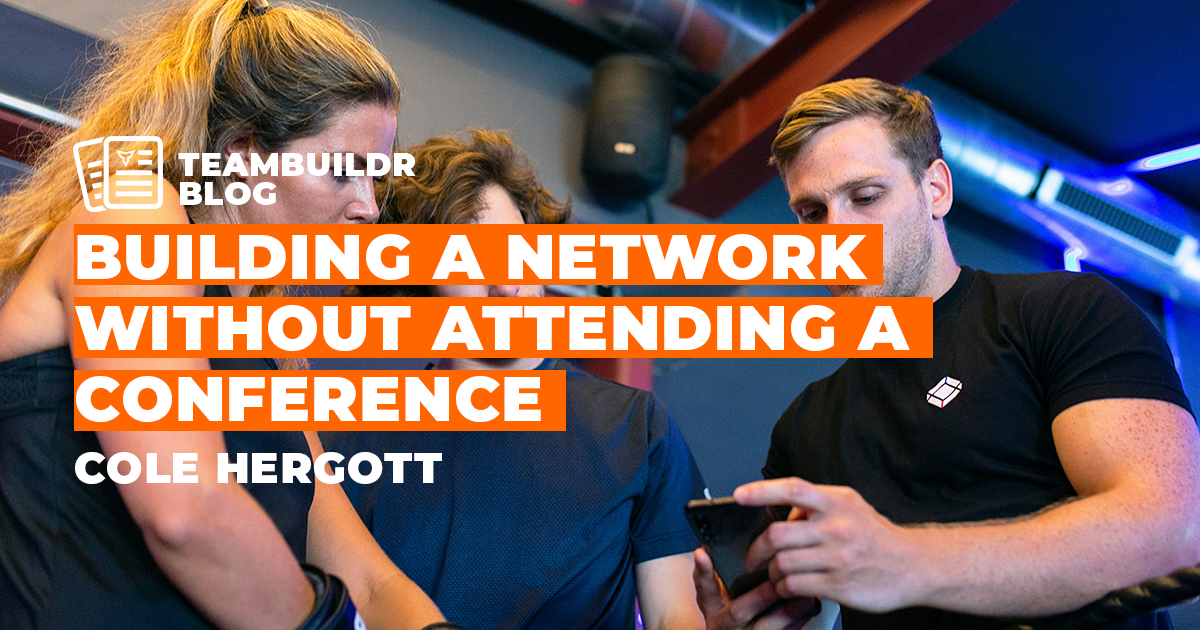This is How You Network Without Attending a Conference
Everyone understands the importance of having a wide professional network. Young coaches often struggle to understand how to get their network off the ground. I hope by the end of this article that you will have a decent idea how to begin expanding your network without attending a conference, and by using the current resources that you have.
Spoiler: Attending the next national conference is NOT part of it…
What Networking is NOT:
I am going to give you five strategies that will help all coaches extend their networks. Before I dive into that, I would like to mention that it’s not often the size of your network that matters, but the depth of it.
I see a lot of young coaches mention the size of their networks and how they know “sooo many people." Often, I ask, “Do these people you speak of even know you?” A handshake and a three-minute introduction at the CSCCa National does not mean they are now part of your network. Too many young coaches mistake this as such. Also, networking is not TRANSITIVE. You are probably wondering what I mean by that. Tell me if you have heard this statement before:
“Yeah yeah I know that guy. My buddy who coaches at X University coached with him at Y University 12 years ago when he was an intern there for 4 months…”
Sound familiar? I hear this out of young coaches and interns a lot, and I hope they understand that their transitive relationships are good but are usually not that useful and hard to leverage. Networking first and foremost begins with being a good person. If your mindset of networking is to only find people who will help you get a job, your relationships will not find true meaning and depth.
1. Site Visits
Networking is about building a working relationship that benefits both parties. One of the best ways to get to know another coach is to visit and watch them coach IN PERSON! There are many lessons we can learn from watching other coaches do their thing. It will also give you context to their coaching and programming strategies. Try your best to make time to sit down and have some conversations to plant that relationship seed while you are there. Allow the conversation to be genuine and organic. I cannot name one coach who doesn’t like to sit down and talk about their program, their coaching journey, and the obstacles they have overcome along the way. Search for the programs near your area and reach out! You never know what may come of it.
2. Social Media
Social media is one of the biggest parts of my professional development. This is just as useful to me, if not more useful than reading Supertraining. I have used this medium to stay connected with a lot of minds that are greater than mine. There is great content being pushed out on social media every single day that continues to challenge my mind as a coach. I suggest you hop on this train NOW or it is going to leave you behind. The best part about it? It’s FREE! I suggest following the coaches that are at the top of our industry in the sectors you want to know most about. Also, if you see a conversation going on that you are interested in, do not hesitate to jump in! Answers are only found by asking great questions. Creating dialogue on topics is what keeps us coaches sharp. Actively participating in the S&C social media realm is 100% worth your time.
3. Phone/Video Calls
This is a common practice for strength and conditioning staffs around the country already. They take an hour out of their week to reach out to an expert on a specific topic and discuss it. This should not be limited to strength staffs. This can be done by all coaches at every level. For example, one of my weak points as a coach is knowledge in sports nutrition. I reached out to Alan Bishop, the Director of Performance for Men’s Basketball at the University of Houston and asked him a few questions on a topic I needed to know more about. Coach Bishop went on to get me on a phone call and inform me on way more than just nutrition. We began to get to know each other and found out we are both from small towns in south Alabama. You never know what you may find out. All you have to do is ask!
4. Lunch & Dinner Meetings
Some of the best networking has happened without attending a conference, and simply over lunch, dinner, or drinks. Getting outside of the weight room is also a great way to truly get to know someone. Networking is multi-faceted. The coaches who are most willing to vouch for me are the ones who know me best as a person. Not that they won’t reinforce that I have exceptional coaching skills, but it Is the trust built over time that trumps everything. Even though this article is mentioning how to network without attending a conference, the best times I have had with other coaches were at a conference, but AFTER the conference was over! Take some time to take a coach out to lunch or dinner to just get to know each other. Conversation will not be hard to come by, trust me. So many coaches need to see your character, integrity, and personality before they will stick their neck out for you. Having the coaching skills are just a prerequisite to getting a recommendation.
5. BONUS: Email Follow-Ups & Thank You Notes
The fifth and final tip I have is an add-on to all of the above I have stated. YOU MUST FOLLOW UP IF YOU WANT YOUR RELATIONSHIPS TO GROW! If you meet a new colleague, make sure you gather information to reach back out to them. Just from my experience, DO NOT just hand a coach your resume. It is a huge turn off. Have a crisp and clean business card with your contact information (email and cell phone) plus your credentials. This is the easiest way to gather contact information. Also, writing hand written thank-you notes go a long way. If a coach makes time to spend with you and invest in you, the least you can do is say thank you. Coaches today are so busy with their work and are away from their families. If they make time to spend with you, make sure you show gratitude. It goes a long way.
Subscribe to our blog
Subscribe to receive the latest blog posts to your inbox every week.
Related posts

4 Ways to Build Your Network Without Conferences

6 Tips for Strength Coaches to Be Better at Conferences and Clinics

